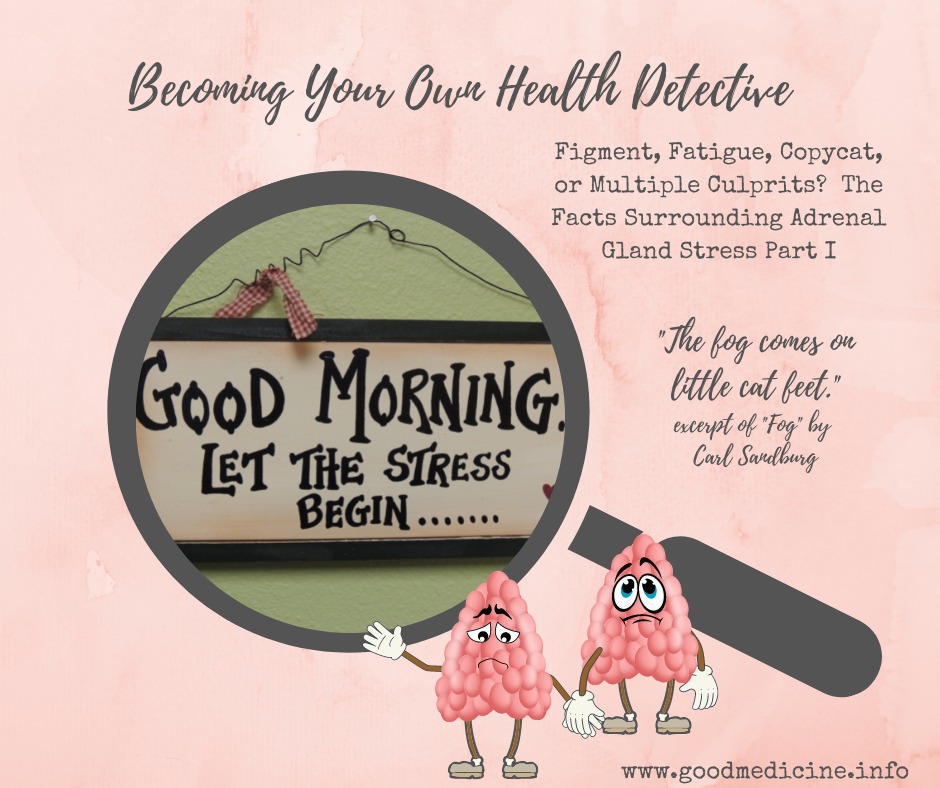
Figment, Fatigue, Copycat or Multiple Culprits? The Facts Surrounding Adrenal Gland Stress Part I
Several months ago, I wrote a series recognizing stress as its own particular mafia-like crime family bent on creating mayhem within the body. You’ll want to pull that crime scene file as a reference tool as we address adrenal gland health, function and distress. Adrenal fatigue is not an officially recognized entity within western medicine and should not be confused with Addison’s disease, a rare disorder which causes severe and permanent adrenal insufficiency only relieved by medication. The progression of adrenal fatigue is akin to watching an automobile accident happen in slow motion beginning well before the actual collision. A series of events took place leading up to the actual accident. Separately, fiddling with the radio, the wet streets, the tread a little too worn on the tires, the kids wrestling in the back seat, the phone ringing, the car in front slamming on their brakes didn’t cause the accident. The accident occurred because of an accumulation of events. Such is the case with adrenal fatigue.
As this crime scene is dis-assembled and reassembled, bear in mind that there will be many overlapping clues leading to other dis-ease states: anemia, sleep apnea, autoimmune disorders, subclinical infections, POTS, hormonal impairments, major organ disorders and deficiencies (common ones being B12, folate, iron/ferritin, magnesium, and Vitamin D), and perhaps these dis-ease states may be playing a role in your personal crime scenario that is (or is not) adrenal fatigue.
leading to other dis-ease states: anemia, sleep apnea, autoimmune disorders, subclinical infections, POTS, hormonal impairments, major organ disorders and deficiencies (common ones being B12, folate, iron/ferritin, magnesium, and Vitamin D), and perhaps these dis-ease states may be playing a role in your personal crime scenario that is (or is not) adrenal fatigue.
The biggest baddest clue in town for adrenal fatigue is all manner of stress, specifically the stress that has led up to this point. Adrenal fatigue is predated by at least two years of chronic stress that nearly always comes from more than one source. Every single crime scene is different, and in order to map out your particular story, you’ll want to spend a little time putting together a timeline of clues. On your timeline, you’ll want to log the dates and each incident in all of the following categories of stress:
On your timeline, you’ll want to log the dates and each incident in all of the following categories of stress:
-
Hospital stays
-
Surgeries
-
Significant illnesses (anything that kept you home and required recuperation time)
-
Chronic, auto-immune, or degenerative disorders (include first symptom dates and actual diagnosis dates if possible)
-
Dental work (root canals, implants, tooth removals, filled cavities, infections etc)
-
Significant emotional events (a death of a loved one, loss of job, divorce, traumas, mood disorders, etc)
-
Prescription medications (including both short term therapy such as an antibiotic and long term therapy such as blood pressure medications)
Adrenal fatigue creeps in on little cat feet, and if you are aware of the predisposing factors you have every chance of heading it off before it creates enormous issues within the body. Ideally, you’ll use this book (and other reference materials) to recognize what could happen when “the scene is being set up” and will implement wisdom and discernment to head off disaster at the pass. (said in my best John Wayne voice! )
)
When you’ve put your health history together (as suggested above), hang on to this document and add to it as your life story is written. Additional factors that add to or aggravate the stress load include:
-
Having a “Type A” personality
-
A chronic (mental, emotional, or physical) stress which keeps you in a low grade “fight or flight”
-
A severely stressful event
-
Working to the point of exhaustion
-
Harboring chronic or simmering anger
-
Harboring even low grade (subclinical) infections (bacterial, parasitic, viral, fungal)
-
Excessive chronic caffeine intake
-
Excessive exercise
-
Poor diet, mal-absorption or mal-digestion issues
-
Very little play or relaxation time
-
A toxic (physical or emotional) environment.
-
A chemically toxic environment
-
Chronic inflammation (remember that not all inflammation is painful. Proper labwork may identify inflammation you may not even be aware of)
-
A sedentary lifestyle
-
Poor sleep habits or sleep deprivation
-
Too many years on a high fat/ high protein diet
-
PTSD
-
Concurrent conditions that also set the body up for adrenal fatigue include MTHFR gene variance, mitochondrial disorders, a sludgy liver, EMF toxicity, a previously existing endocrine imbalance (subclinical hypothyroidism, estrogen dominance, insulin resistance, etc)
-
Maternal stress during pregnancy (Epigenetics! The fetus’ body is programmed to address stress as his/her mother did while in utero)
Living in today’s world, it’s fairly safe to say there isn’t a single one of us who has remained unscathed.
The stages of Adrenal fatigue go something like this:
Stage I: Fatigue, but hormone production hasn’t yet been affected
Stage II: Fatigue, anxiety, and possible irritability. It may take longer to fall asleep than it used to, and harder to stay asleep. Infection rate has increased (getting sick more often), and hormone and thyroid symptoms have begun showing up. This would include PMS and menstrual irregularities.
Stage III: All of the above plus multiple diagnosed endocrine system imbalances (sex hormones, thyroid, pancreas) and severe fatigue. Common diagnoses at this stage also include:
-
POTS
-
Blood sugar imbalances
-
Cardiovascular irregularities (beat, rhythm, and blood pressure)
-
Anxiety diagnoses
Stage IV: the line between Adrenal fatigue and Addison’s Disease gets blurry.
Clues surfacing within “active” adrenal fatigue stages will become more pronounced as progression occurs unless you take charge of the situation. Awareness is key, because this is your opportunity to stop the crash before it happens! Reminder: there are usually multiple causes for each clue, and you’ll want to pair these clues with the “stress load” profile you built (above). What you may begin to see is a series of unrelated events, circumstances, and health clues all crescendoing towards the same thing… adrenal glands that are growing weary from “running from the lion” day in and day out. Remember, look at the entire puzzle, not the individual pieces
surfacing within “active” adrenal fatigue stages will become more pronounced as progression occurs unless you take charge of the situation. Awareness is key, because this is your opportunity to stop the crash before it happens! Reminder: there are usually multiple causes for each clue, and you’ll want to pair these clues with the “stress load” profile you built (above). What you may begin to see is a series of unrelated events, circumstances, and health clues all crescendoing towards the same thing… adrenal glands that are growing weary from “running from the lion” day in and day out. Remember, look at the entire puzzle, not the individual pieces ! Some of the more common clues seen within adrenal fatigue staging include:
! Some of the more common clues seen within adrenal fatigue staging include:
-
Gaining weight, especially around the abdomen (estrogen dominance will do this too)
-
Fragile skin
-
Inability to turn the brain off
-
Feeling anxious or nervous without good reason
-
Feeling overwhelmed
-
Infections that are lasting longer than they should
-
Need a stimulant such as coffee to get started in the morning
-
Reduced libido
-
Lightheaded when rising from a horizontal position
-
Intolerance to exercise
-
Fatigued but restless
-
Tending to wake up between 2-4am most nights
-
GI function that has become irritable or hyperactive often combined with mal-absorption issues that ultimately lead to deficiencies
-
Loose hanging fat around the belly, combined with thin arms and legs, and a puffy face
-
Pain in the upper back or neck that doesn’t have a reasonable explanation
-
Feeling better physically when away from the source of stress
-
Receding hairline and/or unexplained hair loss
-
Afternoon napping
-
Your day looks something like this:
-
Wake up but need coffee or stimulant to function
-
Energy boost mid morning
-
Energy crash around 2pm
-
Energy revive around 6pm
-
Crash again around 9pm but wide awake at 11pm
-
Intense cravings of sweet and salty food
-
Increased incidence of environmental and food allergies and sensitivities
-
Decreased ability to cope with stress
Mind, body, and spirit stress is everywhere, and we all need daily Jesus, Thieves Household Cleaner, good food, appropriate sleep, and all the emotionally relaxing oils we can use! My favorite emotional oils are Frankincense, Lavender, StressAway, Peace & Calming, and Valor which all have some very interesting “worth the dive” science supporting their role as tools for healthy stress management.
See you next week as we dive a little deeper into the muddy waters of adrenal fatigue!
xoxo~ liz
